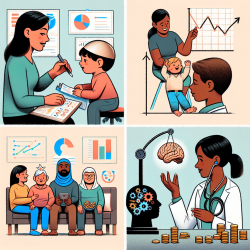Introduction
As a professional in speech-language pathology, understanding the broader family dynamics and economic factors that influence child development is crucial. The research article "Family Matters: Decade Review from Journal of Family and Economic Issues" provides valuable insights into how economic conditions and family relationships intersect, impacting various aspects of family life. This blog aims to explore these findings and discuss how they can be integrated into speech-language pathology practices to improve outcomes for children.
Key Findings from the Research
The research highlights several areas where family economics and dynamics intersect, including:
- Family Formation Decisions: Economic stability is a significant predictor of family formation decisions, such as marriage and childbearing. Understanding these factors can help practitioners consider the broader context of a child's family environment.
- Gender and Relational Power: The study discusses how financial power dynamics within families can affect relationships and parenting roles. This knowledge is crucial for speech-language pathologists when considering family interactions and communication patterns.
- Parenting and Finances: Economic stress can impact parenting styles and the quality of parent-child interactions. By recognizing these stressors, practitioners can tailor their interventions to support both the child and the family effectively.
Implications for Speech-Language Pathology
Integrating these findings into speech-language pathology can enhance the effectiveness of interventions. Here are some practical applications:
- Holistic Assessment: Incorporate questions about family economic conditions and dynamics into assessments to gain a comprehensive understanding of the child's environment.
- Family-Centered Approaches: Develop intervention plans that consider the family's economic and relational context, promoting strategies that support both the child and family members.
- Collaboration with Other Professionals: Work closely with social workers, psychologists, and educators to address the multifaceted needs of families, ensuring a coordinated approach to intervention.
Encouraging Further Research
While the current research provides a solid foundation, there is a need for further studies exploring the specific impact of economic factors on child development and communication disorders. Speech-language pathologists are encouraged to engage in interdisciplinary research to deepen our understanding of these complex interactions.
Conclusion
By integrating insights from economic and family dynamics research into speech-language pathology, practitioners can better support children and their families. Understanding the broader context in which a child develops allows for more tailored and effective interventions. To read the original research paper, please follow this link: Family Matters: Decade Review from Journal of Family and Economic Issues.










